Art and Mental Health Interview with Peter Smetanick
"Art and writing for me comes from the soul, but the mind can be a tricky place, with dark corners. Writing brings me to understand the deeper parts of my being."
I approach the study of art and mental health in myriad ways but sharing interviews with contemporary artists and writers is probably my favorite of them all. My own lived experience is poignant but naturally limited. While I try to read widely, I’m drawn towards the same sorts of stories again and again. Through interviews, though, I get the chance to meet a wide range of different people who have different takes on this topic I care so much about. Today, the person who I’m happy to have sharing their thoughts with us is
of Peter's Scribbles .Peter blends fiction with non-fiction in creative ways that read a bit like a well-edited personal journal. Or, as he puts it on his About page:
“Most of my work is pulled directly from my life, but then spun further with my own imagination.
“I’m inviting you on my personal journey. It’s a writing journey, but also a journey into the mind of a bipolar psychotic. I’ve been living with a mental illness diagnosis for nearly 15 years. It’s taken over my life, but writing gives me an outlet like no other.”
“I have a difficult time labeling myself as a writer, but it is my passion, my sanity, and my very life depends on it at times.”
Let’s learn more …
What would you like to share with us about your own mental health experience?
Over the last number of years I have become very open about my bipolar diagnosis. Although I still struggle greatly at times, I hope to reach out to others who are on a similar journey and be...well. A beacon of hope. I also get the vibe that mental illness is still very stigmatized in society and would love to do my part in breaking down barriers.
I am diagnosed Bipolar I with psychosis, at least that is what I've come to accept. I have a long history of manic episodes, however, over the past 5 or 6 years I have been dealing with the other end of things. No mania, but plenty of depression. I am on medication for my diagnosis, which seems to make things more manageable, but there are still great strides to be made.
I agree that there’s still stigma in talking about this, particularly for men. And there’s additional stigma about medication, so thank you for being open about that.
Before we dig further into mental health, I’d love to know more about your creative self …
As far as creativity goes, I am simply a writer. I enjoy playing with words. As well as stories, I also enjoy poetry and the personal essay. I grew up thinking and feeling that men were not emotional beings, or at the very least were not supposed to let on that we felt feelings. I still struggle with this, even today. Writing is my way of letting these deeper feelings out, because otherwise they bottle up and come out sideways and upside down.
What has your writing journey looked like?
At a very young age I loved looking through my father's comic books. At first I didn't pay too much attention to the little word bubbles; I just was fascinated with the visual art. My parents bought me art supplies and tracing paper. I loved bringing my favorite heroes to life on my own, characters such as Batman, Spider-Man, and Wolverine.
Anyone else interested in comic books and also mental health? I recommend checking out Marbles by Ellen Forney and Hyperbole and a Half by Allie.
As I grew older I excelled in my language arts classes. I fell in love with reading at a pretty young age and moving to a country town only advanced my reading further. There was nothing to do but read. I'm not sure I would call him my favorite author, but I have read quite a lot of Stephen King. Beginning with Pet Sematary. I must have been no older than 4th grade.
I think so many of us writers started as readers. I also read Stephen King quite young - It and The Dark Half. Were you writing at that age as well?
I didn't really start my own creative writing until high school and early college. My outlet growing up was actually sports. I was an All-State Goalkeeper in soccer and played for the team at Radford University. However, I began dealing with early signs of mental illness and my mental health in general declined. I was experimenting with drinking and marijuana use.
And yet, I was also beginning to find my writing voice. Most of my writing has dealt with the darker side of mental health and personal well-being. I've always written stories that are related to real life events or situations. Almost like an advanced form of a journal. For me it helps greatly to put things down into words and give them a place to live, other than my mind. One of the most common symptoms for me is intrusive thoughts. I have dabbled in meditation, which seems to help, but writing gives me joy as well as relief.
In what ways have mental health symptoms affected the content that you write?
I'm honestly not sure how to separate my writing from my mental health symptoms. My writing is my mental state put into words. I'm currently working on a "fictional memoir" which focuses on remembering. I've been going to these corners of my mind that I didn't necessarily know were there. It is a form of therapy for me and it is a great challenge.
I'm not even convinced it is all worth it, but I'm trying to stay positive and focused because one thing I struggle with is finishing projects that I've started. As I've mentioned above, the writing I have shared is sort of a journal for an audience. Inviting folks into my life, my mind, and my progress as a writer. I wish to be as honest as possible in my writing and perhaps folks will be able to relate.
That makes sense to me. Many of us write first to understand ourselves. So the content is what’s in the brain, in some form or another. And, hopefully, sometimes that connects with what’s in someone else’s brain.
So that’s the content, what about the process of writing?
At this point in my mental health journey...and for me that's what it is, a journey … let me digress on that: It was a long road down and now I think I'm on the way up. Sometimes it does feel like one step forward, two steps back. But I try to keep the hope and positive vibes alive, even in the darkest hours I do my best to protect the flicker of a flame within myself.
So, at this point in my mental health journey, I have been striving for a true writing schedule. However, it is very difficult for me to keep that schedule at the moment. I am starting to accept that perhaps a rigid schedule is not how I work. My mood is pretty stable over the last number of years, but I still suffer from daily symptoms, which interrupt my ability to hit my goals. However, I try to be patient with myself.
I'm learning everyday, which I feel is the biggest win at the moment. I recently went back to school full-time, and I must say I really killed it that first semester. It was a challenge, but it was the first time I ever finished a semester with straight A's. The following two semesters were even more of a challenge however, and I am currently looking to return to work.
But I will try to tie all this rambling into a neat bow. My writing process is very "organic" and unstructured. I feed off the mood I'm in, I know no other way. It is often most difficult just starting to put words down because in my process I am always editing as I go. I am not the most efficient writer, but I enjoy my process all the same. Doesn't that matter at least a little bit? Enjoying life and enjoying the creative process.
It matters most of all, I think. I’ve often found that I need to toggle back and forth between structure and less/no structure as it relates to my mental health. To set goals but them be gentle with myself if meeting them isn’t working.
Also, congrats on going back to school. I’ve done the same and it’s really courageous and powerful to do so!
I’ve found that manic periods and depressive periods often have a different impact on the same person’s creativity. Any thoughts on that?
During a severe mental crisis, whether it is a manic episode or depressive episode, I have a difficult time focusing on my writing. However, I do find it much easier to write during depression phases than when I am going through a manic phase. For me mania almost always leads to a state of psychosis. I am reluctant to share too much in this interview about specific episodes, I am working my way towards writing about that in my serial Where the Sunbeams End. However, I will say that psychosis for me completely turns my world upside down. Delusional thinking runs rampant. It's a state where my mind moves so quickly and jumps to conclusions very easily. It's like blasting off into another galaxy.
Looking back at my various episodes, I realize that I was "off my rocker," as I like to say, but deep down these episodes and ways of thinking remain with me. I still fear falling back into a psychotic state because it has mostly resulted in chaos and regret. I've lost many friends who have experienced my behavior during these episodes. My life has been greatly affected by bipolar, which in turn affects everything about my writing. One thing that bipolar has taught me is having compassion for all beings. Forgiving and understanding myself is what I'm still striving for, but my work as a writer seems to be helping me along this journey.
I want to circle back to something else you said - tell us about intrusive thoughts …
I struggle most with intrusive thoughts. It's as if my brain never shuts off! That pesky voice inside or stream of internal words. Many of these thoughts are negative in nature, what you might refer to as the critic. Often this symptom slows down my writing, sometimes even bringing it to an all out halt. So, although I am getting better at coping, it still requires quite a bit of energy to find the peace of mind to write. To find that zone.
A ruminating mind and intrusive thoughts are one of my hardest symptoms as well. It seems to be a consistent part of the depressive experience for a lot of people. It’s hard to create when your brain is telling you all of the reasons not to.
I'm striving every day, but as of now I am constantly looking for that golden window of opportunity to get the words down. In recent years I have been battling some pretty deep depression, which at times is crippling.
I feel lucky because I imagine it could be worse. I know I have a certain resilience about me. Something that I need to keep from sliding into deeper depths.
But it is pretty bad at times. Days where I can't see the beauty in my own writing or much beauty in the world for that matter. Days where I give up. I hope I one day reach a place where I am a scheduled and disciplined writer, because I do believe I have the talent as well as something important to say.
Honestly, writing for me at this point in time is about self discovery and growth. I look forward to when I can write a bit beyond that bubble.
In what ways have mental health symptoms impacted your self-perception / identity as an artist?
Growing up as a relatively successful athlete, that's what I always thought of myself first. I accepted that I was a dumb jock. And still now there is a part of me that thinks I'm simply a burnt out has been. I haven't had an easy time calling myself an artist or a writer. I have this definition in my head that you must be a published author to call yourself a writer. I know this isn't true, yet I still battle with the idea.
Being diagnosed with a mental illness is a real mind trip in itself. You mean I'm crazy? Diagnosis sent me down a rabbit hole of self doubt and confusion. I talk a little bit about it in my story "Dreams and Memories."
But yes, I struggle with my identity as an artist and writer. Not sure if it's from my bipolar symptoms or simply the life of a writer.
Good point. A lot of writers have difficulty calling themselves writers for all kinds of varied reasons that may or may not have to do with mental health.
What have your experiences been when sharing your writing?
A lot of my writing may be described as emotionally raw. I get my fair share of praise from my writing peers and others. Oftentimes I get the vibe that they feel for me, but don't necessarily enjoy my work. My stuff deals with darker themes and who wants to be brought down?
I go about my writing in a different way from a lot of writers; I understand that. I feel welcome among artists, they're some of my favorite people. But not all artists are mentally ill. Many are creative beings who love to share their work and brighten the world. I am a bleeding heart who is crying out to the world. I think there is a difference.
Definitely true that not all artists are living with mental illness! I do think, personally, though, that we all exist on a spectrum of creativity and mental health and many people can relate to at least some degree to a small portion of the experiences those of us with a diagnosis have.
Okay, let’s switch gears to something a little lighter for a minute … do you write on a computer or by hand?
I always prefer to write on a laptop, rarely do I even take notes by hand. I enjoy the feeling of typing. I've grown up in the digital age, so it's something that just feels natural as well as satisfying. Just the sound of the keys being punched means I'm in the place I prefer to be. But now that I think about it, perhaps I should try writing by hand whenever I am sitting at my desk struggling to get the words typed out.
What is the number one way that writing helps you?
Writing is a must for me. It helps me understand myself and how I fit into the world. By getting words down I am able to let go in a certain way, because I can always go back and read again. I don't have to carry that story or emotion around with me any longer.
In what ways has creating art hindered or harmed your mental health?
Sometimes the writing and diving deep is very difficult, however the work is generally worth it in the long run. I've never been disappointed or felt that I damaged my mental health through my art. Perhaps it brought up things deep down that are unpleasant, but I honestly believe that is the work all of us should be doing. Digging deep to the root of our being and attempting to be better people who can bring love into the world.
In your own words, what do you think is the relationship between art and mental health?
In my eyes, art and writing is how I make sense of my world. I'm often confused, depressed, and feel without a purpose. My writing is always there. George Carlin once talked about how a writer could never commit suicide. They'd go to write their note and end up writing a book, giving them a reason to live.
Art and writing for me comes from the soul, but the mind can be a tricky place, with dark corners. Writing brings me to understand the deeper parts of my being. It's how I express myself. It keeps me going.
What a terrific way of phrasing that.
Before we wrap up, I’m always interested in what other writers read … what should I read next related to this topic?
A great book for writers that deals a bit with mental health is called, "Writing Down the Bones: Freeing the Writer Within." Written by Natalie Goldberg. It's not completely concerned with mental health, but does offer a way to look at your writing in a more "sane" way.
Connect with Peter on Instagram: peterscribbles.
A few of my favorite posts from Peter include:
If you read this far, perhaps you liked the work. The work does take work. It only continues with support, so please consider subscribing. My annual rate starts at $10 per year.


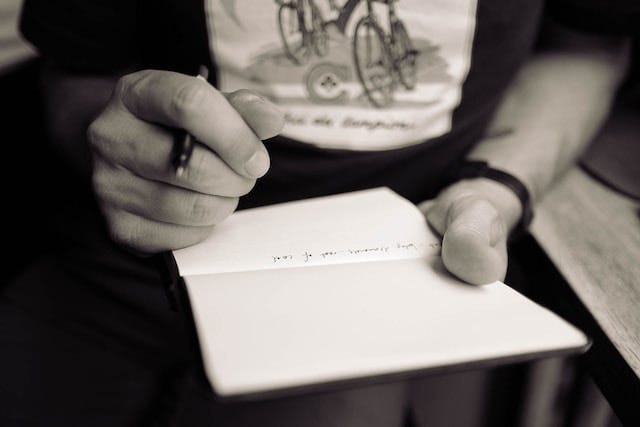
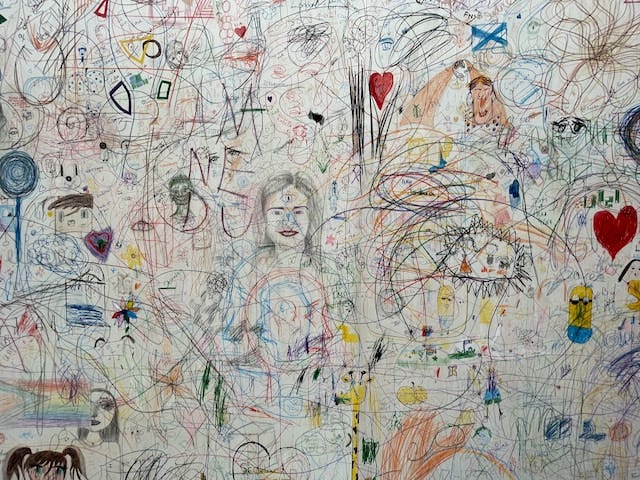

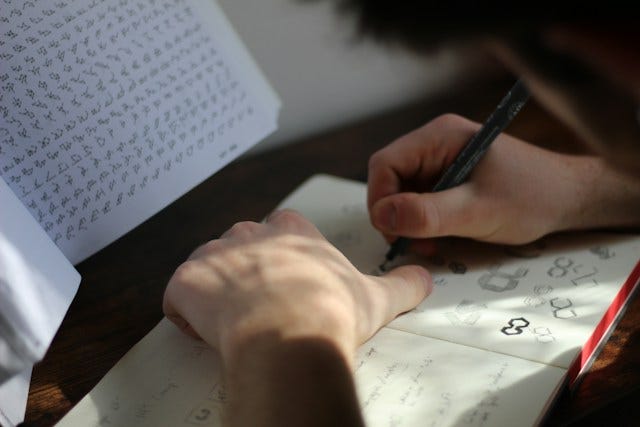

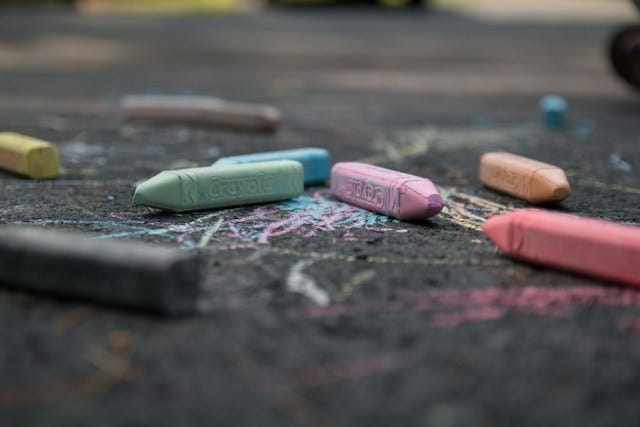

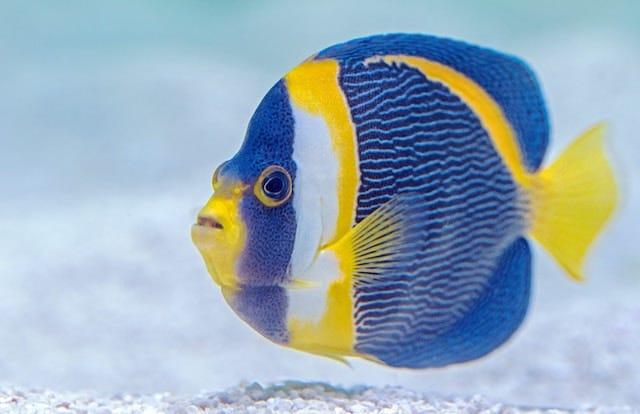




Hey Kathryn, just wanted to again say thank you for putting this together! It was a pleasure to work with you on this and honestly the interview itself helped me to understand myself further, good vibes your way :)
The highest form of creation is to take personal issues and spin them into engaging stories.